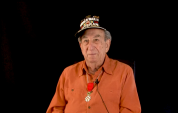9:53 | Upon arriving in Europe, Locker and the rest of his troop spent a lot of time training for the D-Day Invasion. Here he speaks of stories concerning those training exercises and the invasion itself. (This interview made possible with the support of RUSSELL G. JOHNSON.)
Keywords : Irving Locker World War II D-Day preparation training exercise tanks Utah Beach machine gun seasick LST ammunition (ammo) planes mines

Irving Locker grew up the youngest of seven children and lived a moderate lifestyle before training at Fort Dix and Camp Davis. It was during this time that he was also trained to use huge 90mm guns. (This interview made possible with the support of RUSSELL G. JOHNSON.)
Traveling overseas for the second world war would prove to be one of the greatest challenges Irving Locker would face. Unfortunately with a boat ride of that magnitude, there's bound to be plenty of seasickness. (This interview made possible with the support of RUSSELL G. JOHNSON.)
On many occasions, Irving Locker and his men were given instructions to conduct a ten mile march forward. Here he talks about his experiences with that, and how it felt to scavenge the area for dangerous terrain such as minefields. (This interview made possible with the support of RUSSELL G. JOHNSON.)
After the success of the D-Day Invasion, Irving Locker finally got to visit Paris. His men were the first ones there during the liberation effort, and here he documents exactly what that felt like. (This interview made possible with the support of RUSSELL G. JOHNSON.)
After the war ended, Irving Locker recalls a few reunions he had from his unit that stand out to him. Following this, he talks about the last big pieces of the war, including the Siege of Aachen and the Battle of the Bulge. (This interview made possible with the support of RUSSELL G. JOHNSON.)
After the war was finally over in 1945, Irving Locker and the rest of the American Army had to sail back home first. This meant a lot more seasickness, but it was worth it when they finally got to see their families again. Following this, Locker was the recipient of the French Legion of Honor. (This interview made possible with the support of RUSSELL G. JOHNSON.)